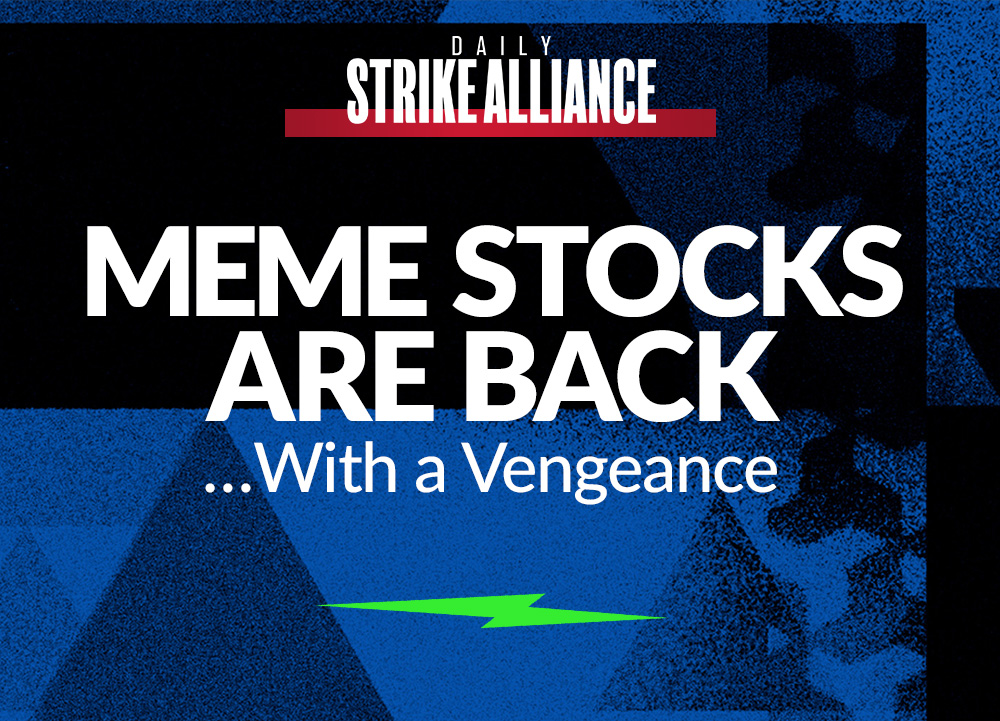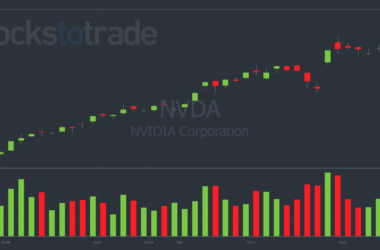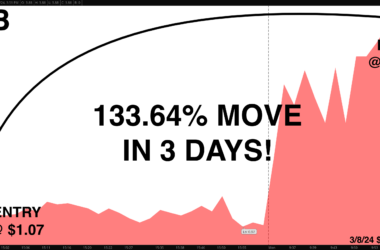Good morning, traders…
Ben here.
One story is dominating the market right now.
Meme stocks are back … with a vengeance.
There’s a retail-trader groundswell happening this week that’s impossible to ignore as the geniuses over at r/WallStreetBets are taking over the real Wall Street once again…
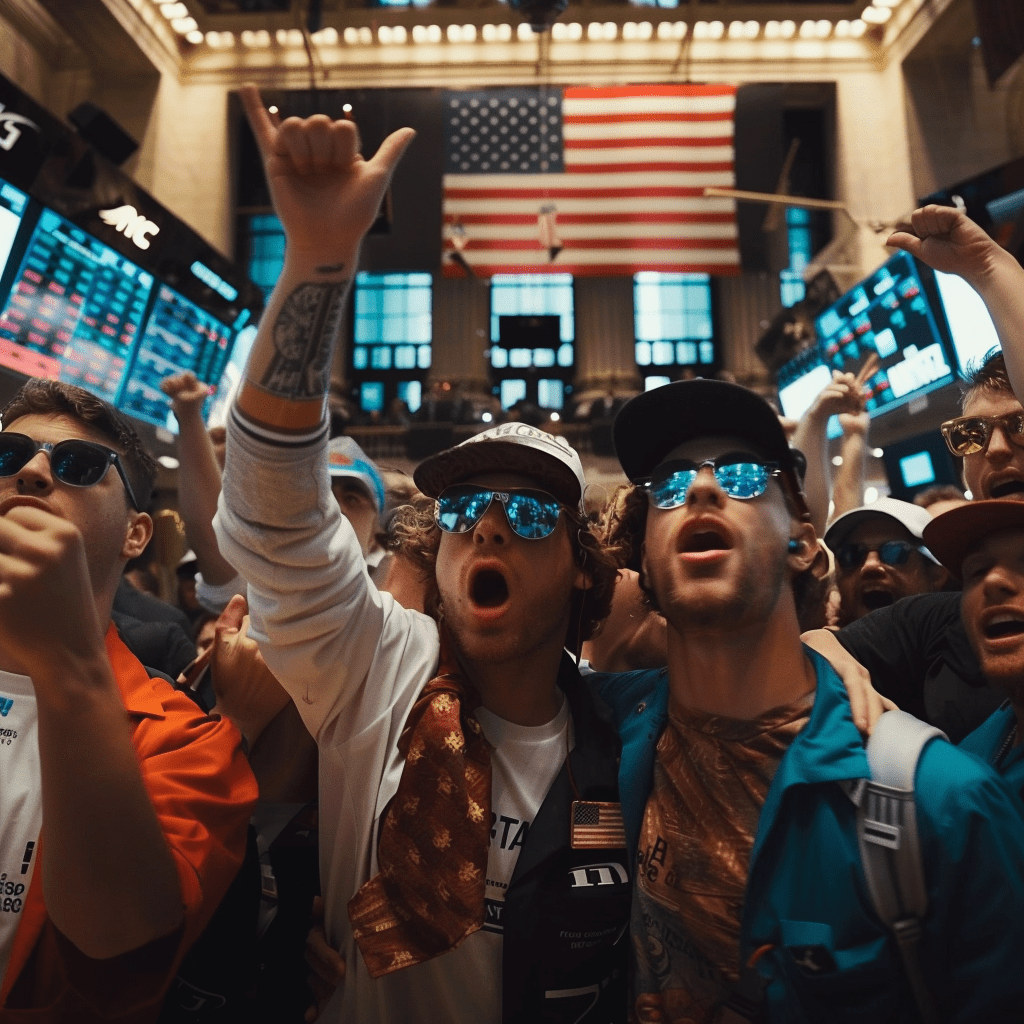
It all started when Keith Gill (a.k.a. Roaring Kitty) — the Reddit trader and “deep value investor” whose research sparked the infamous 2021 GME short squeeze — started posting on X for the first time in three years.
In response, the king and queen of meme stocks — GameStop Corp. (NYSE: GME) and AMC Entertainment Holdings Inc. (NYSE: AMC) — have surged as much as 273%* and 304%,* respectively, over the past two trading days.
Meanwhile, the May 17-expiring call options in both names have gained thousands of % over the same period.
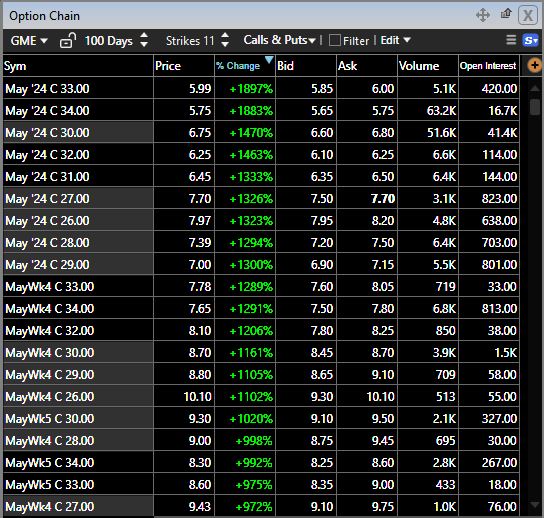
Most traders think these are textbook short squeezes. As hedge fund short interest in these names increases, and the share prices go lower, the motivation for retail traders to “squeeze” the stock upwards becomes greater and greater…
But this isn’t exactly right. You might be missing a critical piece of this meme stock puzzle…
AMC and GME aren’t normal stocks — so don’t treat them as such.
In reality, it’s not all basement-dwelling, Reddit-posting, Gen-Z retail trading driving these squeezes…
Rather, a secret options-trading mechanic is working behind the scenes to cause these rip-roaring moves to the upside…
Welcome to the Meme Stock Renaissance
Over the past several days, we’ve witnessed a mini-renaissance for meme stocks…
GME, AMC, BB, SPWR, KOSS, and SPCE — all classic meme stocks, all up double-digits two days in a row.
This isn’t a coincidence. These names tend to move together.
It’s a bullhorn from retail traders. They’re saying “We haven’t gone anywhere.”
Wall Street keeps shorting their favorite stocks at their lows and eventually gets punished with an epic squeeze.
We’ve seen it happen time and time again over the past several years — and this week is no different.
I love seeing it. These are classic ‘supernova’ stocks, one of Tim Sykes’ favorite patterns…
See the only chart pattern you need to position yourself for profits BEFORE they happen … Sign up for Supernova Alerts NOW.
But these aren’t normal short squeezes, they’re gamma squeezes.
And to fully understand how this mechanic works, you have to be aware of who is on each side of the trade…
Who’s Pulling the Strings?
As an options trader, every time you buy contracts, there’s a market maker (MM) on the other side of the trade who’s gaining money by selling them to you.
MMs are individuals or entities who professionally buy and sell options contracts, looking to profit off of the bid-ask spread.
MMs use a variety of pricing metrics to determine how much the buyer of an option should pay for a particular contract.
These guys aren’t like me — trying to book big gains trading options. Instead, they focus on selling contracts with size and volume.
The more you trade, the more they make.
But just like smart traders, experienced MMs always want to protect themselves from losses…
The ideal strategy for MMs is to stay “market-neutral.” They try to avoid oversized positions in one direction or another.
But maintaining a neutral stance can be a double-edged sword…
When bullish traders spot an opportunity to take advantage of this neutrality, that’s when the possibility of a gamma squeeze takes center stage…
What is a Gamma Squeeze?
Gamma squeezes are like short squeezes … on steroids.
They occur when the price of a heavily shorted stock begins to rise, prompting a chain reaction among options traders and market makers.
Options contracts provide leverage to traders, which is why gamma squeezes can spark a larger price increase than a traditional short squeeze.
In options trading, gamma is a measure of the rate of change of an option’s delta.
Gamma increases as a contract gets more toward the center of an options chain. In contrast, the gamma value will decrease as the contract gets further into, or out of, the money.
(If these concepts are confusing to you, read my full breakdown of ‘The Greeks’ right here.)
In this crazy market, gamma, delta, and implied volatility (IV) can combine to create remarkable upside moves.
In a gamma squeeze, bulls target short-dated, low-delta option contracts and buy them up furiously — sending IV and gamma to astronomical highs.
The squeeze rallies the price of the targeted contract (and all of its surrounding strikes). It’s exactly what we’re seeing in these GME and AMC moves.
There are four main components to a gamma squeeze:
High Short Interest: GME has an unusually high short interest, meaning a large % of its available float is sold short. This makes it a prime target for a traditional short squeeze, where rising prices force short sellers to buy back shares, further driving up the price.
Retail Trader Movement: A large number of retail traders are buying GME shares and call options. This influx of buying pressure pushes the stock price higher…
Call Options and Gamma Squeeze: As the stock price rises, the value of call options increases, and their delta increases as well. MMs who have sold these call options need to hedge their positions by buying GME shares, adding to the buying pressure. This leads to a gamma squeeze, where the need to hedge options positions causes rapid and significant increases in the stock price.
Feedback Loop: The combination of a short squeeze and a gamma squeeze creates a powerful feedback loop. Short sellers are forced to cover their positions by buying shares, and MMs are buying shares to hedge their call options, both of which drive the stock price up even more.
What This Means for Meme Stocks
These moonshots we’re seeing in GME and AMC would’ve been impossible without options.
And, naturally, you would’ve potentially earned larger profits trading the options rather than the “meme stocks” themselves.
That said, be careful. Don’t chase these moves on day three or four.
Remember what happened last time…
In 2021, big money hedge funds started buying in-the-money (ITM) puts, giving the MMs no choice but to short common shares of the underlying stock in an attempt to hedge the puts they sold to Wall Street.
This caused a “double whammy” effect. The downward price pressure came from two places simultaneously — put-buying from hedge funds and common-share shorting by MMs.
If hedge funds go back to the same playbook and begin reverse-squeezing MMs in this way again, the selling pressure could be too much for the retail army to combat.
I mean, look what’s already starting to happen…
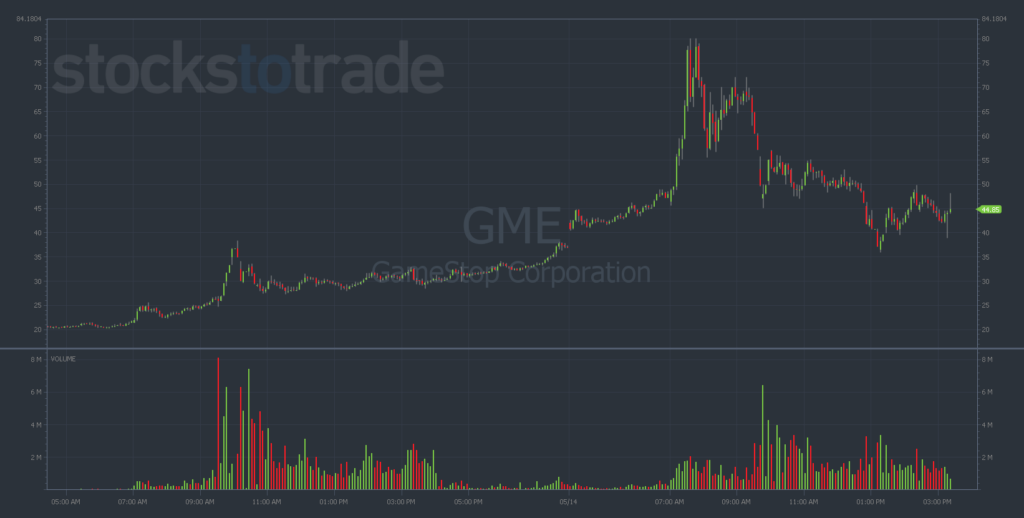
At the time I’m writing this (less than an hour away from the closing bell on Tuesday), the momentum already seems to be dying off, with GME nearly 30% off the high of the day.
Just a warning. Always know your history.
Now, before we go, let’s look at:
💰The Biggest Smart-Money Bets of the Day💰
- $2.33 million bearish bet on LCID 06/21/2024 $5 puts @ $2.33 avg. (seen on 5/14)
- $1.78 million bullish bet on MA 07/19/2024 $475 calls @ $4.15 avg. (seen on 5/14)
- $1.58 million bullish bet on XLE 06/21/2024 $90 calls @ $4.50 avg. (seen on 5/14)
Happy trading,
Ben Sturgill
P.S. While everyone else is trying to chase meme stocks, I’ll be using the Pathfinder Phenomenon to discover even better setups…
This approach allows regular retail traders — like YOU — to finally take advantage of tools and tactics previously only used at hedge funds…
According to Wall Street legend (and my good friend) Jeff Zananiri, “Regular traders have never seen anything like this. Honestly, this tool ought to be locked in a vault underneath Wall Street…”
TODAY, May 15 at 4 p.m. EST … I’m hosting a LIVE MASTERCLASS to break down everything you need to know about the Pathfinder Phenomenon.
What are you waiting for? Click here to reserve your seat.
*Past performance does not indicate future results

